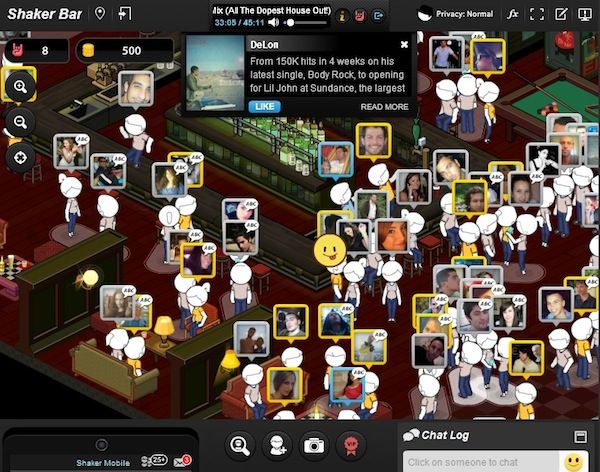The latest club to launch in San Francisco -- Club 53 -- last Friday night by Israeli brothers Yonatan and Gad Maor, has an impressive list of musicians lined up to visit and perform, including Far East Movement, Mayday Parade, Escape The Fate, and Daniel Bedingfield.
The brothers’ company, Shaker, has partnerships with BandPage, a leading platform for musicians online, and Live Nation, which will promote tours to Club 53, including the Rockstar Energy Drink Mayhem Festival and the Rockstar Energy Drink UPROAR Festival.
What’s different about the Maor brothers’ club is that it is all virtual; its only “address” is Facebook.
Club 53 is the first public virtual environment launched in the U.S. by Shaker, which over the past year has been operating similar online venues in Israel.
As you can probably see from the screenshot above, once you sign in via your Facebook account, and enter a Shaker room, your avatar is able to move around that environment, with your Facebook identity clearly displayed.
The avatars of your friends will be wearing blue shirts; friends of friends will wear yellow, and others will wear gray.
These “Shakers” (carriers of your profile) move around the room alone or in pairs, pausing to chat in small groups, dance, or buy each other virtual drinks.
Emoticons float up from above the heads of some guests, and various gestures indicate animated conversations from around the room.
There’s music and a sense of excitement in the air.
Shaker Co-Founder and CEO Yonatan Maor said the idea for the company came to him after a particularly fun night out on the town in Tel Aviv a couple years ago.
“I started to think about why we didn’t have those sort of live, vivid social experiences online, on Facebook, so my co-founders and I decided to create a platform to allow that.”
(There are nine co-founders including the Maor brothers.)
A large part of the interactive experience at Shaker is based on perfecting proximity-based chat. Up to six people can chat in one location at one time.
When you move around the room and approach other people, some of the things you have in common (such as other friends or favorite bands) become visible, facilitating conversations.
“Like all good ideas, Club 53 came to us from the users,” says Maor. (And, specifically in this case, from users who are musicians.)
“These artists starting using Shaker to promote their work. They’d come to the venues and we’d play their music. They made repeat visits. It was helpful for them. It became clear that with people hanging out and artists crashing the party, so to speak, there was an opportunity here.”
In a larger sense, Shaker is trying to bring a sense of place to the social network.
“The question is how to recreate social circles online,” notes Maor. “Who’s going to be there? The people have to be relevant and local. We’ve done that.”
Shaker is more tightly integrated with Facebook than anything else I’ve seen, including Zynga games. It’s not hard to imagine that as Facebook evolves, it may well take on more of the look and feel of Shaker elsewhere in its interface.
Beyond venues like Club 53, Shaker has a deal with the NBA to host virtual events before and after games during the NBA Finals, which are about to begin, and it has also hosted virtual peace conferences in the Middle East.
In January this year and again in May, Shaker brought together on its platform Israelis, Palestinians, and Americans to discuss the issues that divide them. In the January conference, Secretary of State Hillary Clinton, Israeli President Shimon Peres, and Palestinian Authority President Mahmoud Abbas all pre-recorded statements about the need for peace in the Middle East that were broadcast during the event.
Related Articles
